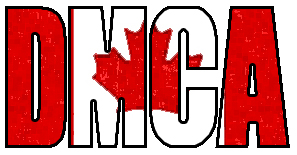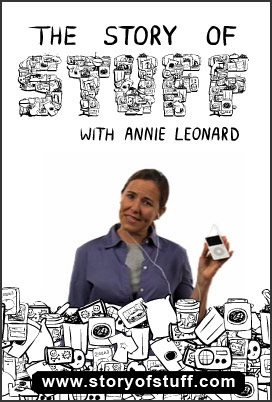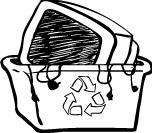One of the brilliant online activists I “subscribe to” on Identi.ca and “follow” on twitter is Techrights founder Dr. Roy Schestowitz.
Roy passed along the link to this excellent The Story of Stuff video:
The Story of Electronics:
Why ‘Designed for the Dump’ is toxic for people and the planet
Because an increasing number of people use GNU/Linux operating systems, or simply resist using the proprietary Flash software, I’ve made a tinyogg conversion which I’ve hosted on my website here: The Story of Electronics – OGG conversion
You can read more of what Ms. Leonard has to say in her
The Huffington Post piece, or read what Geek Dad had to say in Wired about Annie Leonard’s latest film.
Find out more about Annie Leonard’s The Story of Stuff Project including steps that we can take to get involved on her website.
I think that this film is brilliant in its simplicity; it explains exactly what is wrong with what Annie Leonard calls the Electronics industry’s “Designed for the Dump” strategy.
They try to make this sound palatable by calling it “planned obsolescence”.
Deliberately manufacturing short lived physical materiel is not environmentally sustainable.
Bill C-32 legislates stuff to the Dump

Bill C-32, the so-called “Copyright Modernization Act,” has finished Second Reading and is in committee.
In spite of near universal opposition to this legislation which continues many bad elements first seen in its predecessors, Bill C-60 and C-61, the draft Bill C-32 ignores the majority of citizen input provided through the 2009 Copyright Consultation.
Michael Geist told Jesse Brown Bill C-32 will probably pass this time in the November 9th TVO Search Engine podcast.
But as bad as the American DMCA is, Bill C-32, the Canadian version will be much worse.
The DMCA does not make any aspect of their Fair Use regime subservient to technical measures, making the DMCA closer to the intent of the 1996 WIPO treaties to tie TPMs to infringing activities than C-32.
My biggest problem with Bill C-32 as written is that it makes it illegal to circumvent “digital locks,” which are often called DRM (Digital Rights Management) or TPM (Technical Protection Measures), this latter being the language favored by Bill C-32. These “digital locks” are placed on our media and devices by manufacturers to control how we consumers can use the digital media and devices.
Q: How does “The Story of Electronics” tie in to the draft Canadian Bill C-32?
A: Making repair and recycling illegal will legislate Electronics to the Dump
By making circumvention of digital locks illegal for any purpose, electronics and media that still work, or that could be made to work, will now be legally consigned to the dump. Format shifting, recycling and repair of electronics with digital locks will be illegal.
Digital Locks prevent format shifting.
Unlike videotape, DVDs will play in any DVD player. At least until manufacturers add region encoding (digital locks/DRM/TPM). When a Florida company shipped me a European DVD instead of the region 1 DVD that I would have been able to play on a Canadian DVD player, for me the DVD was garbage. I couldn’t play it the first time.
The company was aware that it was an error and shipped me a new copy of the DVD that was Region 1, so I wasn’t out of pocket. (They did not want the DVD back.) But the environment was.
When people move geographical locations if they move to a different “DVD region,” suddenly all their old technology and media can no longer be used because of digital locks. The ONLY reason that this is so is because of the digital locks applied by the manufacturer. Their idea is, as always, to sell more stuff. Wringing extra money from the consumer.
Consumers want to format shift, again for personal use, so that they can access their legally purchased content on their different devices.
When media and the devices we play it on become obsolete they proliferate in our dumps.
Digital Locks prevent us from repairing problems caused by DRM/TPM
Nobody seems to talk about the fact that the addition of digital locks/DRM/TPM quite often makes our media and devices not work. Ever had trouble playing your home burned home movie DVD in your DVD player. Or your grandmother’s DVD player? How about burning home movie DVDs at all.
Chances are that your digital stuff doesn’t work/is broken BECAUSE of digital locks. DRM. TPM,
If Bill C-32 passes as is, it will be illegal to fix it.
reusing, recycling
I foolishly bought an HP bubble printer without realizing the ink cartridges have DRM. It doesn’t matter how much ink is actually left in the cartridge, my cartridges are empty when the digital locks say they are. Which means, among other things, that I can’t save money and the environment by refilling them.
But I expect that refilling printer toner cartridges that have TPM will be illegal under Bill C-32 too.
No one is talking about this. Are they copyright issues? They should not be. But it once circumventing digital locks becomes illegal across the board I would expect they would be covered by Bill C-32.
Then there are all the OTHER uses of digital technology. Digital elements exist in refrigerators and cars, not just music and movies. If there aren’t TPMs on these things now, there will be once Bill C-32 becomes law. Because if circumventing digital locks is illegal, manufacturers would be foolish not to put digital locks on anything they can.
Which would be an even worse environmental catastrophe. Governments should not be legislating anti-interoperability. For the good of the environment.
Canada’s technology will not just be
“Designed For The Dump”
but
“Legislated To The Dump”
by Bill C-32

[[Note to Malcolm Gladwell: yes Malcolm, there are online activists, and you know what? They do good work!]
The Story of Stuff Project’s “The Story of Electronics” is licensed under a Creative Commons BY NC ND license
Bill C-32 can be found online,
as can Digital Copyright Canada’s: Bill C-32 Frequently Asked Questions



[…] This post was mentioned on Twitter by Russell McOrmond, Laurel L. Russwurm. Laurel L. Russwurm said: "Bill C-32 and the Environment" the new Oh! Canada blog post: http://ur1.ca/2ecir #BillC32 #environment #DRM #TPM #techr #cdnpoli […]
[…] Bill C-32 and the Environment […]
[…] Bill C-32 and the Environment whoacanada.wordpress.com […]